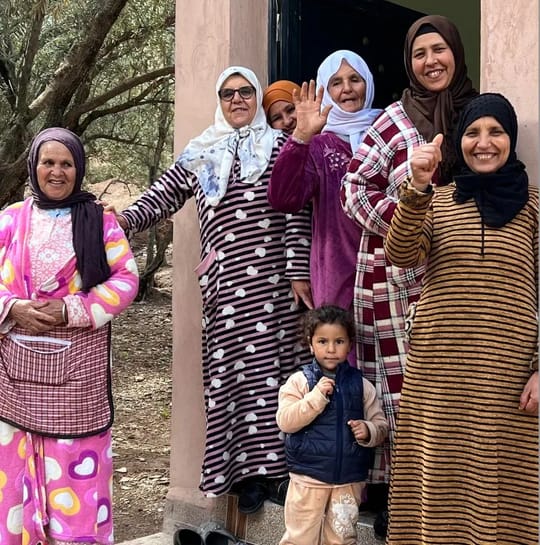By: Emily Hamilton
29/07/2016
About thirty minutes outside of Marrakech lies a small town near the High Atlas Mountains. Ourika looks more like a cluster of small villages existing side by side, just off of the main road from Marrakech. Far down a dusty lane, past a beautiful garden growing saffron flowers, past the traditional clay houses common in Morocco, is an unassuming house.
The inside is cool and dark and it takes a minute for my eyes to adjust. Up a flight of stairs in the large room above the entrance, there is a flood of light from the windows. The house is unfinished and unpainted, save for the beautiful white crown moulding with ornate filigree designs carved around it. Olive trees that surround the house peek in through the windows, their silvery leaves sending dappled sunlight into the room. Around fifty women sit around the room, some making couscous, others minding children. Happy, working noises fill the small space; conversations between many different women at once, interspersed with collective laughter and the sounds of playful children. I am warmly greeted by the women I have met before, and shyly observed by those I haven’t.
This is the Ourika Women’s Cooperative, founded out of the needs of the women who live here with the assistance of the High Atlas Foundation. These women, many of them from Berber communities, have learned traditional crafts like weaving rugs, dyeing wool using local plants and making couscous. The ultimate goal is to be able to sell their goods in local stores and possibly in international markets, so these women might have a chance to thrive. I wanted to sit down with some of them and find out how the cooperative came about, especially within such a patriarchal society like Morocco.
Most of the women speak Berber, a handful of them speak classical Arabic, and the few who were lucky enough to attend school when they were young also speak French. Amina El Hajjami, the coordinator for this women’s group, helps translate between everyone. I am welcomed, ushered onto a small stool, and accepted into the fold without question. I watch as a few of the women finish their batch of couscous for the day, their hands hypnotically working the dough until each piece forms into many perfect, tiny grains. I ask about their lives, their children, their work, and how they feel this cooperative has changed their opportunities. Most of the women are too shy to speak to me directly, but a few speak up. One woman, Fatima, describes her life before and after her husband died. “Before he died, we were happy, we lived well,” she says, “after he was gone, I had no way to support my children.” Finding herself without resources, she had to move in with family in Ourika. Like many of the women here, she struggled to make ends meet, but with the development of this co-operative, she says she feels like things are finally looking up for her.
This story is very similar to those of the other women here. Without education and a support system, many disadvantaged women in Morocco are unable to reach the levels of independence taken for granted by western women. This cooperative gives the women here a business to call their own and a support system for each other. “We used to just sit at home [after the chores were finished] and now we have somewhere to go where we can talk about anything, and we take care of each other.” These women are strong, you can see it in the lines on their faces and in the eyes of their children. While this cooperative has made strides in helping this community and these women to provide for themselves and their families, they still have a long way to go. They need all of our support, so hopefully one day more cooperatives like this can empower other women around the world.
